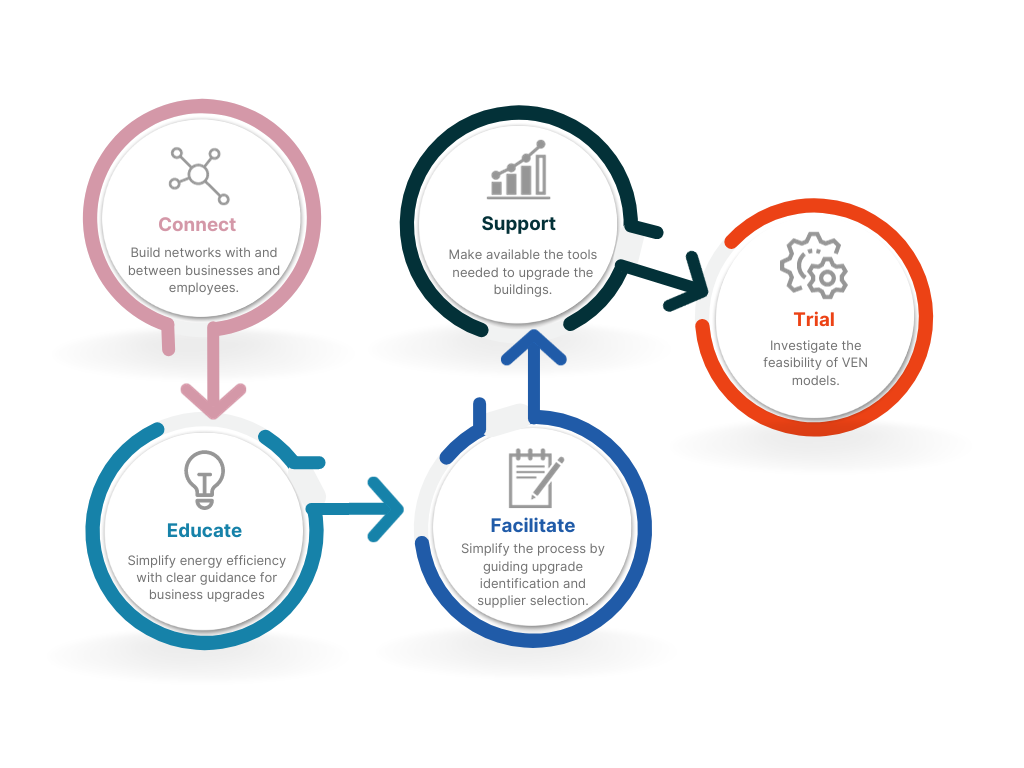Yarra City Council funded us to look into the challenges and barriers present in the Commercial and Industrial (C&I) to decrease their emissions. As part of the Better Energy Better Business (BEBB) project, YEF collaborated with businesses and property owners to identify four main barriers:
Past work
Better Energy Better Business
Financial constraints: We discovered that the lack of incentives tailored to specific business challenges, coupled with businesses’ limited capital for investment, serve as significant obstacles to implementing emission-reducing solutions. Additionally, we found that most businesses perceive an inadequate value proposition from solar and other energy-efficient solutions. The majority view these solutions through the lens of corporate social responsibility or environmental impact, rather than from an economic standpoint. This perception is largely due to the high perceived risk associated with these solutions and their extended return on investment period.
This pattern suggests that businesses regard solar and energy efficiency less as financial opportunities and more as environmental and societal commitments, which often hold a lower rank on their list of priorities.
Knowledge barriers: Through our collaborations with businesses and landlords,
We have observed a lack of technical expertise, which hampers the translation of internal sustainability-driven enthusiasm into actionable plans.
We identified a shortfall in the interpretation of energy data, a crucial foundation for assessing potential improvements. This is instrumental in facilitating effective planning and implementation of energy efficiency strategies, given the necessary monitoring required to financially and socially justify the investment. Additionally, behavioural habits tend to obstruct the integration of sustainability approaches in offices, such as regulating heating and cooling or turning off appliances and lights.
Physical barriers: The City of Yarra is undergoing continuous real estate development, leading to shading on large rooftops by apartment buildings and other high-rise offices. This shading diminishes the efficiency of solar panels and extends the payback periods by one to three years, making them less appealing solutions. Additionally, and this is particularly the case for offices, we found that available roof space is often too limited to fully offset a business’s electricity consumption. It is worth noting that this challenge can be mitigated through Power Purchase Agreements (PPAs).
Key findings
Electricity usage patterns indicate increasing support for data centres and businesses with high refrigeration needs, such as bottle shops, as they have the highest electricity consumption.
Identifying internal “champions” is crucial for actively driving sustainability initiatives within a business.
These individuals serve as the primary contacts, communication stewards, and active participants in project execution. Their proactive engagement is vital for overcoming internal barriers, securing buy-in from other staff members, and ensuring the successful implementation of identified solutions.
We also discovered that real estate development is affecting long-term sustainable investments. Urban growth challenges the lifespan of older, “low-rise” buildings, which often have ample roof space suitable for solar installations. Conversely, the economic value proposition for constructing high-rise buildings frequently outweighs the benefits of retrofitting older structures for energy efficiency.
Recommendations
- Further investigate and model the potential benefits of Virtual Energy Networks, LUoS tariffs and Virtual Power Plants.
- Foster business networks and casual communication channels,
- Amplify impact through educational initiatives,
- Simplify business decision-making process.

Small Business Energy Saver Program
In 2021-2022, YEF was engaged by Sustainability Victoria to assist in the rollout of the Small Business Energy Saver Program. According to Sustainability Victoria, by upgrading to more energy efficient equipment, the 4,426 businesses who participated in the Small Business Energy Saver program since March 2021 have reduced their annual energy bills by more than $3.6 million. The program has also saved 12,890t CO2e annually or 154,900t CO2e over the lifetime of the products.